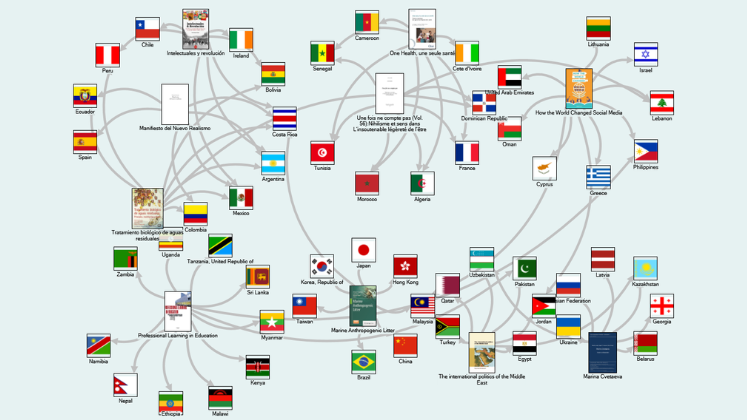Froom books to papers, in 2022 longstanding ways of producing and thinking about academic publications have been in a state of flux. This post brings together ten of the best posts on the theme of the culture of academic publishing that were published on the LSE Impact Blog this year.
 Drawing on research from their recently published and open access history of publishing at the Royal Society, Camilla Mørk Røstvik, discusses how a long view of scientific publication can help us better understand and better respond to current controversies in scholarly publishing.
Drawing on research from their recently published and open access history of publishing at the Royal Society, Camilla Mørk Røstvik, discusses how a long view of scientific publication can help us better understand and better respond to current controversies in scholarly publishing.
The Processual Book. How Can We Move Beyond the Printed Codex?
 Behind the finalised pages of any academic book lies a range of processes and contributions that led to its creation. Discussing her recent work Living Books, Janneke Adema explores how open online tools have given expression to these procedural aspects of academic book publishing and points to how they provide a space in which to re-consider long-held practices contributing to, and the uses of, the contemporary academic book.
Behind the finalised pages of any academic book lies a range of processes and contributions that led to its creation. Discussing her recent work Living Books, Janneke Adema explores how open online tools have given expression to these procedural aspects of academic book publishing and points to how they provide a space in which to re-consider long-held practices contributing to, and the uses of, the contemporary academic book.
 Drawing on a recent survey of forty years of research papers in the field of Science and Technology Studies (STS) and interviews with authors, Wolfgang Kaltenbrunner, Kean Birch, Thed van Leeuwen and Maria Amuchastegui observe an increasing homogenisation of published work. Weighing up the pros and cons of this development, they discuss whether it has enhanced or limited intellectual innovations in STS.
Drawing on a recent survey of forty years of research papers in the field of Science and Technology Studies (STS) and interviews with authors, Wolfgang Kaltenbrunner, Kean Birch, Thed van Leeuwen and Maria Amuchastegui observe an increasing homogenisation of published work. Weighing up the pros and cons of this development, they discuss whether it has enhanced or limited intellectual innovations in STS.
Article Processing Charges (APCs) and the new enclosure of research
 Drawing on a recent analysis of APC pricing and movements within the commercial publishing sector, Gunnar Sivertsen and Lin Zhang argue that APCs have now firmly established themselves as the predominant business model for academic publishing. Highlighting the inequalities inherent to this model, they posit now is the time to consider alternatives.
Drawing on a recent analysis of APC pricing and movements within the commercial publishing sector, Gunnar Sivertsen and Lin Zhang argue that APCs have now firmly established themselves as the predominant business model for academic publishing. Highlighting the inequalities inherent to this model, they posit now is the time to consider alternatives.
 In disciplines where the academic book is the primary means for communicating research and establishing oneself in the field, academics may have a mental shortlist of desirable publishers. However, not everyone can access the most elite or reputable presses, and so some choose publishers with less supposed academic ‘credibility’. Some publishers get accused of spamming authors or other so-called ‘predatory’ practices. Drawing on a recent study, David Mills and Natasha Robinson explore how these practices and choices reflect a commitment to accessibility that challenges traditional models of academic publishing.
In disciplines where the academic book is the primary means for communicating research and establishing oneself in the field, academics may have a mental shortlist of desirable publishers. However, not everyone can access the most elite or reputable presses, and so some choose publishers with less supposed academic ‘credibility’. Some publishers get accused of spamming authors or other so-called ‘predatory’ practices. Drawing on a recent study, David Mills and Natasha Robinson explore how these practices and choices reflect a commitment to accessibility that challenges traditional models of academic publishing.
 In the context of everyday research assessment citation counts are often taken as a simple indicator of the influence of any particular paper. However, all citations are not the same and can be deployed to achieve different ends. Commenting on a recent study of how researchers across 15 academic fields understand the influence of the work cited in their research Eamon Duede shows how citation plays a role both in indicating and shaping the influence of research papers.
In the context of everyday research assessment citation counts are often taken as a simple indicator of the influence of any particular paper. However, all citations are not the same and can be deployed to achieve different ends. Commenting on a recent study of how researchers across 15 academic fields understand the influence of the work cited in their research Eamon Duede shows how citation plays a role both in indicating and shaping the influence of research papers.
There are four schools of thought on reforming peer review – can they co-exist?
 Outlining their recent research into the different interests and commitments of groups looking to reform and improve scientific peer review, Ludo Waltman, Wolfgang Kaltenbrunner, Stephen Pinfield, and Helen Buckley Woods identify four schools of thought on the subject. Discussing their different aims and objectives, they highlight commonalities between them and also key areas in which they diverge. They suggest that in understanding these positions, it opens space for the purposeful inclusion of more varied forms of peer review for research.
Outlining their recent research into the different interests and commitments of groups looking to reform and improve scientific peer review, Ludo Waltman, Wolfgang Kaltenbrunner, Stephen Pinfield, and Helen Buckley Woods identify four schools of thought on the subject. Discussing their different aims and objectives, they highlight commonalities between them and also key areas in which they diverge. They suggest that in understanding these positions, it opens space for the purposeful inclusion of more varied forms of peer review for research.
The dream of ‘editormetrics’ – Why a FAIR dataset of journal editors would benefit all researchers
 Editors are among the most powerful actors in the scientific community. By deciding which papers (not) to publish, they can influence public discourse and nurture – or obstruct – academic careers. However, there is little available information about aggregate patterns of scholarly journal editorships. This may change soon, as Andreas Nishikawa-Pacher writes, thanks to a novel dataset created in collaboration with Kerstin Shoch and Tamara Heck that provides new insights into the landscape of journal editing.
Editors are among the most powerful actors in the scientific community. By deciding which papers (not) to publish, they can influence public discourse and nurture – or obstruct – academic careers. However, there is little available information about aggregate patterns of scholarly journal editorships. This may change soon, as Andreas Nishikawa-Pacher writes, thanks to a novel dataset created in collaboration with Kerstin Shoch and Tamara Heck that provides new insights into the landscape of journal editing.
Food Sovereignty as a model for scholar-led open access publishing
 As large commercial publishers adapt their business models to profit from an increasingly open access (OA) scholarly publishing landscape, there has been an increased focus on alternate scholar-led and diamond forms of open access. Andrea E. Pia and Filippo Zerilli, argue that to effectively compete and outcompete traditional publishers and bibliometrics, scholar-led publications can learn from the slow food and food sovereignty movements that have constructed co-operative systems for quality assessment that bypass the commercial mainstream.
As large commercial publishers adapt their business models to profit from an increasingly open access (OA) scholarly publishing landscape, there has been an increased focus on alternate scholar-led and diamond forms of open access. Andrea E. Pia and Filippo Zerilli, argue that to effectively compete and outcompete traditional publishers and bibliometrics, scholar-led publications can learn from the slow food and food sovereignty movements that have constructed co-operative systems for quality assessment that bypass the commercial mainstream.
Book Review: Book Wars: The Digital Revolution in Publishing by John B. Thompson
 In Book Wars: The Digital Revolution in Publishing, John B. Thompson explores the digital transformations that have turned book publishing on its head over the last 30 years. Offering a noteworthy study of recent changes to the publishing world, this work is well worth reading to understand where the book was in the latter part of the twentieth century and where it is headed well into the twenty-first, writes Amy Lewontin.
In Book Wars: The Digital Revolution in Publishing, John B. Thompson explores the digital transformations that have turned book publishing on its head over the last 30 years. Offering a noteworthy study of recent changes to the publishing world, this work is well worth reading to understand where the book was in the latter part of the twentieth century and where it is headed well into the twenty-first, writes Amy Lewontin.
The content generated on this blog is for information purposes only. This Article gives the views and opinions of the authors and does not reflect the views and opinions of the Impact of Social Science blog (the blog), nor of the London School of Economics and Political Science. Please review our comments policy if you have any concerns on posting a comment below.
Image Credit: LSE Impact Blog via Canva.









2 Comments